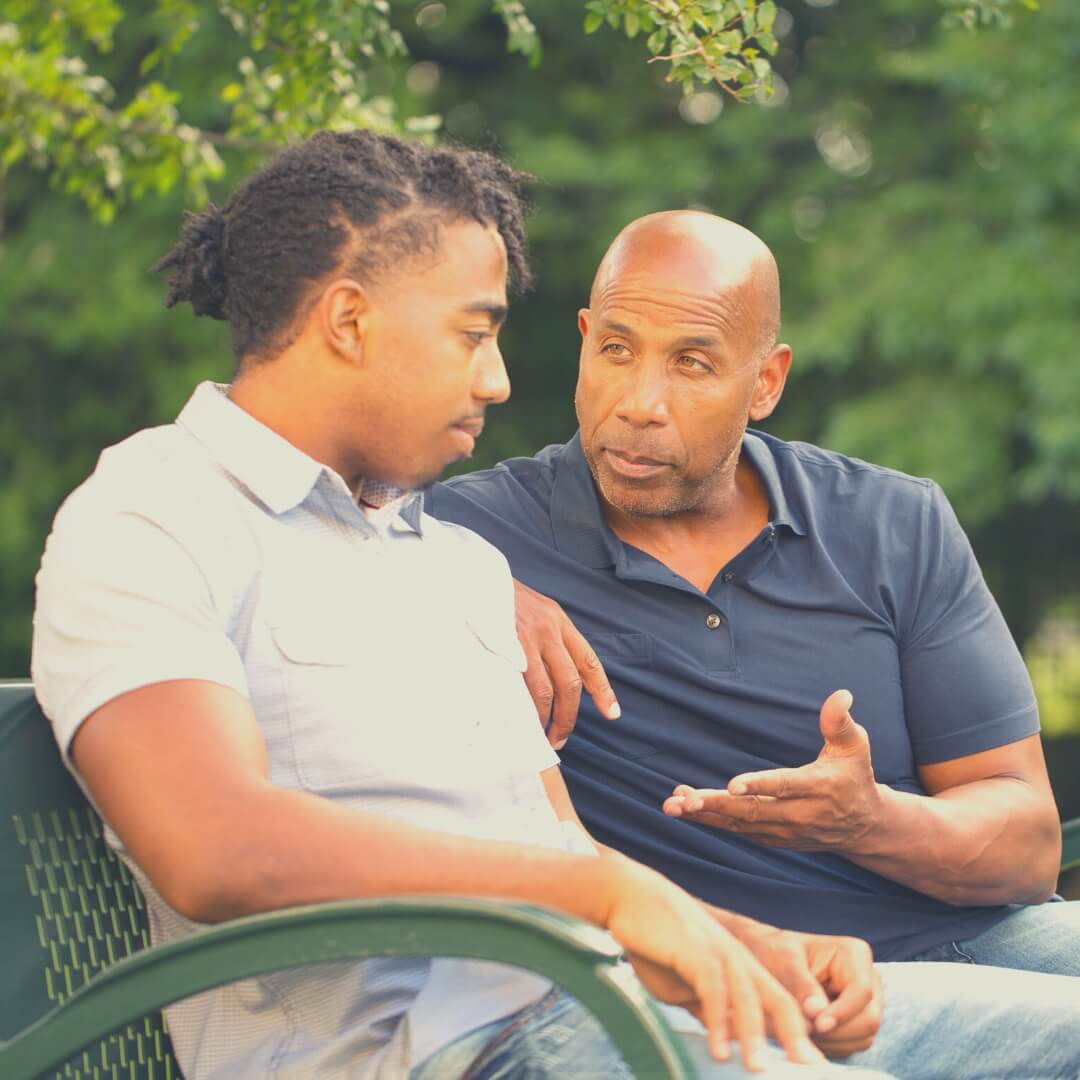Something we usually don’t consider, as parents, is how we will cope with our children as adults… from experiencing challenges of their own to the changing nature of their relationship with us. Of course, we look forward to the day they can independently fend for themselves.
Come to find out, worrying over their needs and safety doesn’t suddenly disappear. Are they safe? Are they happy? Will they be successful?
These are some of the many questions we ask ourselves and we worry about the outcomes. I am quite eager to help ease your mind by providing guidance on how to stop worrying about your grown child. Together, we’ll explore why parents worry about adult children, how to cope, and when your concerns are justified.
Why Do Parents Worry So Much?
Parents are always concerned about their children because of their natural parental instincts. As a parent, you share a deep emotional bond with your child and are wired to be protective. Naturally, you feel helpless once you start losing control over them.
Children grow older and most of them move away at some point. However, parenting doesn’t come with an expiration date. Til’ death do us part. Until then, the challenges of parenting continue. ‘Growing pains’ they call it. The older they grow, the bigger the problems.
You’ll quickly realize that changing dirty diapers and answering 1000 “Why” questions a day was the easy part. You’ll witness your child struggle to find their life purpose or struggle in some other way.
You’ll see them fail and feel sad or depressed. You’ll take on their stress as if it’s yours, forgetting that you already have your fair share of daily stressors to handle.
Separating your challenges from theirs is somewhat difficult to do if you share a close emotional bond. Not only do some parents worry themselves sick, but they also think they didn’t do enough to set their child up for success.
Some of us have had difficulty letting go and that tends to interfere with our children’s independence. Approaching parenting like this could easily turn you into a toxic parent. Other issues regarding your child that can be a source of distress include:
What is a grown child, anyway? A grown-up kid is someone who is no longer a child. In a wider sense, being a grown-up means being “physically and mentally mature and no longer depending on their parents or another adult.” (Dictionary.com).
Age also matters. A child is legally an adult at age 18 in the US. However, a child can begin working at age 16 yet cannot legally leave home to live on their own. For education purposes, a child remains legally dependent if they are in college, until the age of 21 in some states.

According to FindLaw, “It may not be legal to move out at 17, but that doesn’t mean it doesn’t happen all the time…In general, parents and guardians are still legally responsible for such a child’s necessary expenses, even if another adult verbally agrees to take care of the minor.”
Becoming a parent before the age of 18 doesn’t make a child an adult. Parents remain responsible for the needs of their under-aged children until they legally become adults.
* Check your state law as it may differ from the age limits of other states.
9 Steps to Stop Worrying About Your Grown Child
Lingering stress, anxiety, and worry are normal experiences shared by most parents. Your heart may skip a beat practically every time your child calls you. You silently hope they’re not hurt or in trouble.
Living in fear and anxiety and losing sleep over your adult child’s welfare isn’t good for your health. In fact, your health and well-being are as vital as theirs. Rest assured, implementing the following steps might help you let go and trust that they will be alright.
#1. Allow Them to Take Control of Their Lives
Even though it’s almost impossible for parents to completely stop worrying about their grown children, they can learn to loosen their grip. Of course, it takes time, especially if you’re a mom or dad who experiences separation anxiety with your kids.
Once you snap out of it and accept that they have their own lives, you’ll find it easier to allow them to create their own pathway. I think as parents we want to hold the reins for as long as we can out of fear that our children may mess up.
Messing up is all part of the journey and is important for developing valuable life skills.
Besides, trying to control or dictate their story can stunt their mental or emotional maturity. A level of co-dependence can also develop since your child may keep coming back for you to help solve even basic life problems.
#2. Give Them Space to Make Mistakes
Letting go of your adult child can be far more difficult than expected. Don’t be hard on yourself. There’s a deep connection to this person you’ve spent all your life molding and preparing for adulthood.
Not to mention the countless sacrifices you made to ensure they evolve into a good and successful person.
You won’t know if your hard work pays off unless you give them space to show you that you did a great job parenting them. I know you’re eager to save them from making mistakes, especially the ones you yourself made as a young adult.
However, they will make many mistakes. You can’t always be there to catch them before they fall.
Allowing them space to experience challenges and find solutions on their own will help them make better decisions in the future. Taking this step encourages them to take accountability for their errors.
By pulling back, you’ll also have more freedom to live your life. Over time, you’ll grow reassured that they can handle their ‘business’.
#3. Trust Them to Make the Right Decisions
Trust me, you do not want to turn into a parent who micromanages your child. Always wanting to control or dictate their every move is stressful. Not only that, your behavior may irritate your child and push them away.
Adult children feel incompetent if, by your actions, you suggest that they are incapable of making sound decisions. You can avoid making them feel this way and minimize worries by exercising a bit more trust.
Trusting them to do the right thing will empower them and boost their confidence. In addition, your child is able to develop resilience from facing challenges on their own.

In fact, researchers found a connection between experiencing failure and increased resilience. The more your child overcomes setbacks, the more resilient they get. They’ll eventually develop greater problem-solving skills.
So, the next time you find yourself panicking over your son or daughter, inhale deeply and let it go. Remind yourself that you raised a kid who is capable of toughing it out. They may not do it your way. They will lose some battles. What’s important is learning and growing from their experiences.
#4. Try Not to Dwell on Negative Thoughts
Some of us are hardwired to imagine the worse scenarios or expect the worst outcomes. People prone to catastrophizing do that a lot.
Overthinking things and imagining the worst activates the stress region of the brain called the amygdala. Blood pressure and heartbeat increase as a result of a fight-or-flight reaction in the brain to these negative thoughts.
If you’re like this, that’s okay. Life experiences can cause some individuals to be more fearful and anxious, or develop a negative mindset.
It’s possible to change the tendency to think negatively by developing a positive mindset. A mindset shift is an effective way to alleviate worry, panic, stress, and anxiety.
#5. Offer Advice And Respect Their Decisions
Your child is an adult. Don’t be surprised if they ask you candidly to stop dictating how they should live their lives.
You may feel hurt or worry that they are pushing you aside. The reality is, they don’t want you to fuss over them. They’ve watched you work hard to raise them and want you to take a backseat.
If you feel compelled to provide guidance or give advice, hold off until they ask for it. They’ll feel respected and more willing to open up when faced with setbacks.
Listen empathically, offer advice, and leave it there. Remember, it’s up to your child to take your advice or not. Whatever decision they make, respect it. Avoid getting upset and criticizing them if they mess up. Move on and don’t dwell on the outcome.
#6. Offer Emotional Support
Your role as a parent changes from protector and caregiver to supporter and adviser once your child becomes an adult. These new roles are equally important.
Being emotionally supportive instead of controlling helps empower your child and minimizes the potential to worry that they’ll fail.
When offering advice, it’s important to do so in a loving, respectful, and compassionate way. If you judge and criticize their decisions, the less confident they’ll feel and the more likely they’ll keep messing up. The more issues they have in life, the more distressing life gets for them and you.
As a member of their support system, you have a duty to maintain emotional control and not let them see you emotionally distraught. This might cause them to think adulting is tough and scary.
Research also finds that the worries parents and adult children share with one another can negatively affect the relationship.
I made a promise to myself to never break down and cry in front of my children. They see me as their pillar of strength. Knowing they have a strong support system provides the confidence children need to become confident adults.
#7. Set Healthy boundaries
In some cases, it’s the child’s bad behavior that is the source of emotional distress for parents. Some grown kids feel entitled to your support, financial or otherwise.
I’ve seen them guilt-trip, threaten, and manipulate their parents to get their way. This kind of selfish behavior can cause you to feel depressed.
Establishing boundaries, both physical and emotional, is a way to express your limits and limit how much your child’s life affects yours. Don’t rush to help.
Remind them that they’re grown and are required to take care of their own needs. While you are willing to offer support, let them know you’re no longer obligated to do so.
Getting that off your chest can be mentally relieving. Besides, fending for themselves will help them develop resilience.
#8. Talk With Other Parents
Sometimes you think you’re the only one going through a particular parenting problem until you talk to other parents. I’ve found myself blurting out to other parents, “Oh my god, that happens with your kids, too?” Have you experienced the same thing in the past?

Ask other parents how they feel whether they are close friends with grown kids or parents you meet out and about. They may share tips on how to stop worrying about your grown child you haven’t thought about.
You’ll feel as if a huge burden has been lifted off your shoulders after realizing you’re not the only one worried about your adult child.
#9. Keep Yourself Mentally Occupied
Ruminating and harboring negative thoughts about your child’s well-being can take a toll on your mental health. Think of things you can do to switch off from worrying and remain at ease.
Consider meditation, mindfulness, blogging, or journaling. If none of these activities are appealing, a new hobby, such as crafting, might do you some good.
Immersing yourself in mind activities is a great way to manage stress and anxiety about your child’s future. The idea is to stay mentally engaged with pleasant, mind-relieving activities.
I practice mindfulness, a type of meditation practice that involves focusing on, accepting, and enjoying the present moment. Learn more about mindfulness meditation.
When Is It Okay to Worry About Your Grown Child?
Some children have a tough time navigating through life, especially younger adults who are now trying to find their footing. Not having the right life skills or coping mechanisms may cause them to use drugs or alcohol to cope with hardships.
If not that, it could be something like relationship problems, housing problems, or dealing with a chronic illness.
All of these scenarios can be upsetting for you and are legitimate reasons to worry if they’ll be okay. If you decide to intervene, do so respectfully and lovingly.
Help in whatever way you can, but be mindful of the thin line between helping vs enabling them. Do not let them take advantage of your empathy and compassion.
Final Thoughts on How to Stop Worrying About Your Grown Child
While it’s normal to want things to turn out well for your child, you should balance that with protecting your own health. If you let go and trust them to find their way, that alone will help reduce your stress and anxiety levels.
Your child can learn and grow from their mistakes. And don’t be too hard on yourself when they mess up. However, if after all the sacrifice you’ve made, your child is acting up… here’s How to Deal with a Disrespectful Grown Child.


